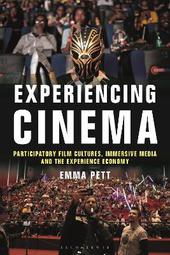
|
Experiencing Cinema: Participatory Film Cultures, Immersive Media and the Experience Economy
Hardback
Main Details
| Title |
Experiencing Cinema: Participatory Film Cultures, Immersive Media and the Experience Economy
|
| Authors and Contributors |
By (author) Emma Pett
|
| Physical Properties |
| Format:Hardback | | Pages:248 | | Dimensions(mm): Height 229,Width 152 |
|
| Category/Genre | Films and cinema |
|---|
| ISBN/Barcode |
9781501352041
|
| Classifications | Dewey:302.2343 |
|---|
| Audience | | Tertiary Education (US: College) | |
|---|
|
Publishing Details |
| Publisher |
Bloomsbury Publishing Plc
|
| Imprint |
Bloomsbury Academic USA
|
| Publication Date |
25 February 2021 |
| Publication Country |
United States
|
Description
Film is often conceived as a medium that is watched rather than experienced. Existing studies of film audiences, and of media reception more broadly, have revealed the complexity of viewing practices and cultures surrounding cinema-going and its exhibition spaces. Experiencing Cinema offers the first in-depth study of participant engagement with a range of experiential media forms derived from cinema culture. From sing-a-long screenings to theatrical extravaganzas, a broad spectrum of alternative film-going practices and immersive spaces are explored and analysed in this original audience study. Moving from intimate community gatherings to blockbuster urban venues, from isolated farmhouses to Olympic stadia, Experiencing Cinema considers the lure and value of these popular events. Often attracting a diverse, intergenerational range of participants, from early-adopter urban hipsters to DIY rural communities, the growing demand for participatory cinema within the contemporary marketplace is analysed alongside broader debates circulating around the move away from traditional tiered seating and increased audience mobility and the de-centring of the film text.
Author Biography
Emma Pett is Lecturer in Film Studies at the University of East Anglia, UK. She has published on the reception and regulation of films in The New Review of Film and Television Studies, The Journal of British Cinema and Television and Transnational Cinemas, and has chapters in Live Cinema: Cultures, Economies, Aesthetics (Bloomsbury, 2017) and Princess Mononoke: Understanding Studio Ghibli's Monster Princess (Bloomsbury, 2018).
ReviewsThis is in my judgement a really rich and valuable book. Built on a combination of deep and wide scholarly reading, linked critically with some really good empirical research into different areas of 'alternative' cinema, it will bid fair to become the key book in the area for some time. * Martin Baker, Emeritus Professor of Film and Television Studies, Aberystwyth University, UK *
|